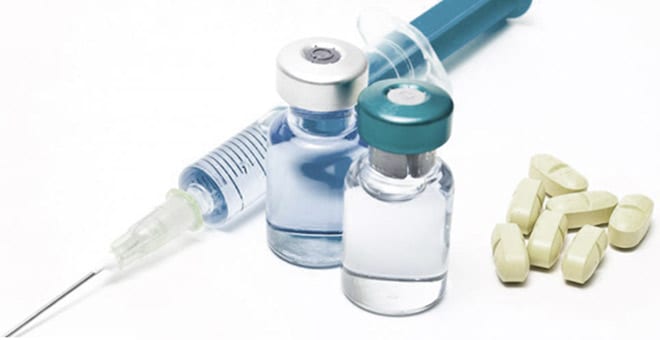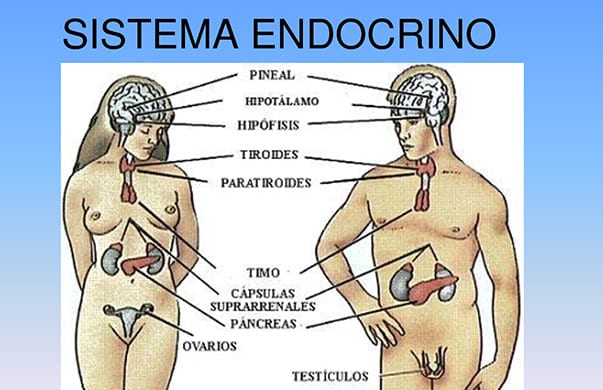Sin efectos secundarios, ayudando al propio organismo a crear hormonas
Envejecemos, en parte, porque nuestras hormonas disminuyen. Las hormonas son sistemas de comunicación del organismo que regulan las funciones celulares y la expresión genética. Cuando las hormonas disminuyen o las hormonas sintéticas se introducen en el cuerpo aparecen los problemas. La reposición de un equilibrio juvenil con hormonas naturales puede restaurar la vitalidad y retrasar muchos problemas de salud relacionados con el envejecimiento.
Los niveles de muchas hormonas bajan con la edad. Algunos de los más antiguos y todavía más populares tratamientos antiaging se basan en la idea de que los cambios hormonales contribuyen al envejecimiento y revertir los cambios hormonales relacionados con la edad será beneficioso.

El más famoso de estos tratamientos supone inyecciones de la hormona de crecimiento humano (hGH). La hormona del crecimiento tiene una larga historia como tratamiento anti-envejecimiento y algunas evidencias sugieren que la hGH tiene efectos beneficiosos en las personas de edad avanzada: los suplementos de hGH pueden aumentar la masa muscular, fortalecer el sistema inmunológico y aumentar la libido. Hay estudios en pacientes con edad avanzada en los que ellos afirman sentirse más jóvenes después del tratamiento con hGH. Aunque la hGH fue aclamada como un gran avance, al igual que muchos otros productos antiaging no cumplió con las expectativas, en parte debido a sus efectos secundarios negativos Estos podrían incluir aumento de peso, presión arterial alta y diabetes. Porque, como su nombre indica, la hGH estimula el crecimiento, pero también se plantea si la hGH podría estimular el crecimiento del cáncer y contribuir al desarrollo del cáncer en pacientes con tumores malignos o premalignos existentes.
El factor de crecimiento insulínico tipo 1 (IGF-1) es otra hormona que puede desempeñar un papel en el envejecimiento y se puede comprar como suplemento. La producción de IGF-1 es inducida por la hormona de crecimiento y, como en la GH, los niveles de IGF-1 disminuyen con la edad.
Otras hormonas cuya producción disminuye con la edad incluyen la DHEA y la melatonina. Se ha informado que la DHEA (dehidroepiandrosterona, prohormona endógena secretada por las glándulas suprarrenales) mejora el bienestar de las personas mayores en una variedad de formas: mejora de la memoria, el sistema inmunológico, la masa muscular, el apetito sexual, y los beneficios para la piel. La protección contra el cáncer también se ha argumentado, pero realmente no hay evidencia científica sólida para ello. También se han reportado efectos secundarios menores tales como el acné
La melatonina es una hormona en su mayoría involucrada en el sueño y los ritmos circadianos, esta última hipótesis la ha asociado con el envejecimiento y la extensión de la vida. Parece que tiene funciones antioxidantes en el cerebro y puede tener algunos efectos beneficiosos en pacientes de edad avanzada, en particular, en términos de sueño. Algunos de sus defensores afirman que retrasa el proceso de envejecimiento y muchas enfermedades relacionadas con la edad, aunque esto está lejos de ser probado. En los seres humanos no existen datos para determinar si la melatonina extiende la longevidad, aunque podría tener beneficios en algunos pacientes. A pesar de que se puede utilizar para algunos trastornos del sueño, también puede causar trastornos del sueño tales como pesadillas. Un estudio afirma que los niveles de melatonina no disminuyen con la edad, excepto tal vez por la noche, aunque debido a enfermedades o medicamentos personas de edad avanzada pueden tener niveles bajos de melatonina. La melatonina también puede agravar el asma.
Por último, para las mujeres, el estrógeno es una terapia anti-envejecimiento muy popular. Esta hormona se utiliza generalmente en conjunción con otras en la terapia de reemplazo hormonal. Existe una vasta literatura sobre las ventajas y desventajas de la terapia de reemplazo hormonal. En el contexto del envejecimiento, no hay evidencia de que el estrógeno sea una terapia anti-envejecimiento viable. Para los hombres, la testosterona también ha sido promocionada como anti-envejecimiento, pero, de nuevo, no hay evidencia de que tenga beneficios contra el envejecimiento, aunque podría tener algunos beneficios como, por ejemplo, aumento de la masa muscular y la función sexual .
Estimular la producción de hormonas
Las hormonas son mensajeros químicos del cuerpo. Viajan en el torrente sanguíneo a los tejidos u órganos. Trabajan lentamente, con el tiempo, y afectan a muchos procesos diferentes, incluyendo
- Crecimiento y desarrollo
- Metabolismo – cómo el cuerpo obtiene energía de los alimentos que consumimos
- La función sexual
- Reproducción
- Humor
Las glándulas endocrinas, que son grupos especiales de células, producen hormonas. Las principales glándulas endocrinas son la pituitaria, pineal, el timo, la tiroides, las glándulas suprarrenales y el páncreas. Además, los hombres producen hormonas en los testículos y las mujeres les producen en sus ovarios.

Las hormonas son producidas utilizando grasas buenas y colesterol, por lo que la falta de estos factores dietéticos importantes puede causar problemas hormonales, simplemente porque el cuerpo no tiene los componentes básicos para hacerlas. Las toxinas que contienen productos químicos que imitan estos bloques de construcción o que imitan las hormonas también son problemáticas debido a que el cuerpo puede intentar crear hormonas utilizando los bloques de construcción equivocados
El sistema endocrino es un sistema complejo que probablemente nunca entenderemos completamente, pero hay algunas cosas básicas que podemos hacer para aumentar la capacidad del cuerpo para crear y equilibrar las hormonas:
- Evitar las grasas poliinsaturadas altas de Omega 6
Las grasas poliinsaturadas son altamente inestables y se oxidan fácilmente en el cuerpo. Estas grasas oxidadas causan la inflamación y la mutación en las células. - Limitar la cafeína
Demasiada cafeína puede causar estragos en el sistema endocrino, especialmente si hay otros factores de estrés hormonales también involucrados, como el embarazo, la presencia de toxinas, el desequilibrio de grasa beneficiosa o el estrés. - Evitar las toxinas.
Las toxinas que se encuentran en los pesticidas, plásticos, productos químicos domésticos, e incluso colchones, pueden contener sustancias químicas que imitan a las hormonas y hacen que el cuerpo no produzca hormonas reales - Dormir bien. Si no logras dormir bastante, tu sistema hormonal no será equilibrado.
- Tomar algunos suplementos básicos, como magnesio, vitamina D, gelatina, maca o aceite de hígado de bacalao.
- Ejercicio moderado, como levantar pesas.
- Tomar aceite de coco: El aceite de coco es increíble para la salud hormonal. Proporciona los componentes básicos necesarios para la producción de hormonas, puede ayudar a la pérdida de peso, reduce la inflamación, e incluso tiene propiedades antimicrobianas y antibacterianas.
- Equilibrar la leptina
La leptina es una hormona principal, y si está fuera de balance, las demás hormonas no están equilibradas. La fijación de la leptina también ayuda a aumentar la fertilidad, hace más fácil la pérdida de peso, mejora el sueño y reduce la inflamación. Esta hormona controla el metabolismo de la grasa, regulando cuánta energía entra en un organismo. Examina y sostiene el equilibrio energético en el organismo regulando el apetito.
La medicina biológica como tratamiento antiaging intenta fomentar la creación de hormonas por el propio organismo.
En Biosalud, tras las pruebas específicas para descubrir si en el paciente se da un envejecimiento fisiológico o patológico, se aplica el tratamiento antienvejecimiento personalizado más efectivo. Con técnicas que van desde la medicina espagírica a la ingeniería de tejidos, pasando por la ozonoterapia o la laserterapia, entre otras, conseguimos frenar el daño celular, mejorar el rendimiento físico y el rendimiento mental, obteniendo una sensación de bienestar y relajación. Somos expertos. ¡Prueba nuestro tratamiento!

5 respuestas
Hola , es de mucha utilidad la medicina anti envejecimiento, gracias por la informacion, deseo conocer cursos, o diplomados sobre el tema, y bibliografia recomendada asi como costos .
Muchas gracias por tu participación, Carmen. Pasamos tu consulta a clínica y te responderán en breve. Saludos
Este tema es super interesante ,yo investigo mucho sobre ese tema ,lo practico y me ha dado resultados extraordinarios . Tengo 75 años y gozo de muy buena salud física y mental .Escribí un libro que se llama el arte de mantenerse JOVEN .
Buenos días.
Tenéis clínica. en Madrid ???
Si, también estamos en Madrid. Le recomendamos que se ponga en contacto con nuestro equipo de atención al paciente y nuestro equipo médico a través del formulario de nuestra web http://localhost/biosalud/contacto/